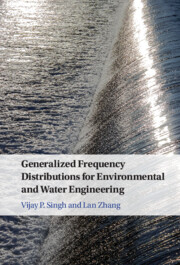Book contents
- Generalized Frequency Distributions for Environmental and Water Engineering
- Generalized Frequency Distributions for Environmental and Water Engineering
- Copyright page
- Dedication
- Contents
- Preface
- Acknowledgments
- 1 Introduction
- 2 Burr–Singh–Maddala Distribution
- 3 Halphen Type A Distribution
- 4 Halphen Type B Distribution
- 5 Halphen Inverse B Distribution
- 6 Three-Parameter Generalized Gamma Distribution
- 7 Generalized Beta Lomax Distribution
- 8 Feller–Pareto Distribution
- 9 Kappa Distribution
- 10 Four-Parameter Exponential Gamma Distribution
- 11 Summary
- Appendix General Procedure for Goodness-of-Fit Study, Construction of Confidence Interval, and 95% Confidence Bound with Parametric Bootstrap Method
- Index
- References
6 - Three-Parameter Generalized Gamma Distribution
Published online by Cambridge University Press: 13 April 2022
- Generalized Frequency Distributions for Environmental and Water Engineering
- Generalized Frequency Distributions for Environmental and Water Engineering
- Copyright page
- Dedication
- Contents
- Preface
- Acknowledgments
- 1 Introduction
- 2 Burr–Singh–Maddala Distribution
- 3 Halphen Type A Distribution
- 4 Halphen Type B Distribution
- 5 Halphen Inverse B Distribution
- 6 Three-Parameter Generalized Gamma Distribution
- 7 Generalized Beta Lomax Distribution
- 8 Feller–Pareto Distribution
- 9 Kappa Distribution
- 10 Four-Parameter Exponential Gamma Distribution
- 11 Summary
- Appendix General Procedure for Goodness-of-Fit Study, Construction of Confidence Interval, and 95% Confidence Bound with Parametric Bootstrap Method
- Index
- References
Summary
The three-parameter generalized gamma (TPGG) distribution is a generalization of the two-parameter gamma distribution and includes as special cases the exponential distribution, the two-parameter gamma distribution, the Weibull distribution, and the lognormal distribution that are employed for frequency analysis in water engineering. In this chapter, the TPGG distribution is derived using the entropy theory and then its parameters are estimated with the principle of maximum entropy and the methods of maximum likelihood estimation and moments.
- Type
- Chapter
- Information
- Publisher: Cambridge University PressPrint publication year: 2022



